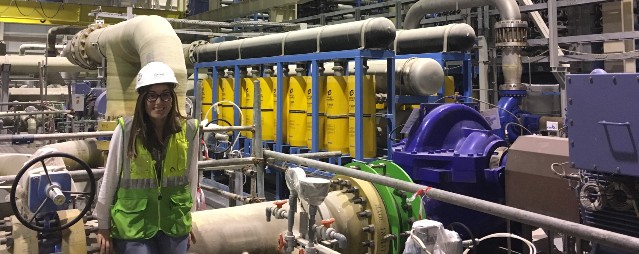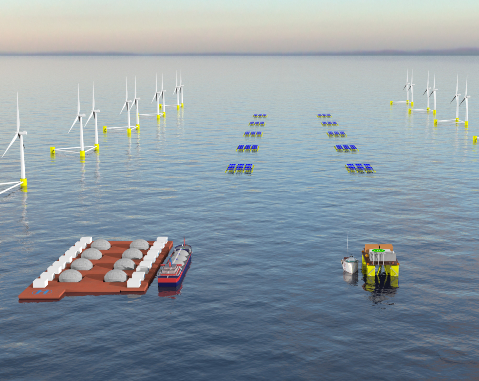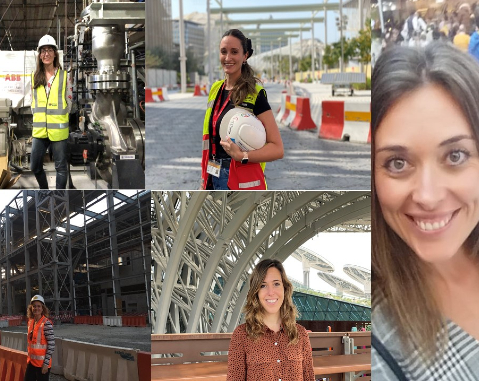- ACCIONA
- Press room
- Blog
- 2020
- December
- Women in water sector
Women in water sector
07/12/2020By Maribel Fornies, ACCIONA Engineer Manager at Jebel Ali SWRO Desalination Plant

ACCIONA has a large group of female engineers around the world that work in their chosen profession every day, achieving the highest standards of excellence.
Engineering is one of those professions that, according to the statistics, does not seem to attract enough women when they choose their career. Nevertheless, history is full of female engineers whose contributions have been fundamental to understanding the world as we see it today.
Women such as Ellen Henrietta Swallow, considered to be the mother of environmental engineering for her studies on water quality in Massachusetts and developing the concept of “environmental sanitation”, the foundation of modern ecology; or Emily Warren, the world’s first field engineer who led the construction of New York’ iconic Brooklyn Bridge.
Today, a vast number of female engineers work every day in this key profession, developing our cities and their societies. Moreover, many of them do so at ACCIONA.
The opportunity to carry out and implement a project such as Jebel Ali SWRO desalination plant in Dubai that enormously is going to improve people’s quality-of-life is something amazing for me. It is extremely satisfying to feel in some way responsible for ensuring access to drinking water for 700k Dubai citizens. To know that you are helping meet an essential need that sadly today is still lacking in numerous regions and communities around the world like the one in where we are living now: the Middle East region.
According to ACCIONA’s latest Sustainability Report, desalinated water production in the Middle East will be 13 times higher in 2040 than it was in 2014. In a region with acute water scarcity, demand for desalinated water is being driven by climate change and population growth. We only desalinate water using reverse osmosis technology, which emits 6.5 times fewer greenhouse gases than thermal desalination. And as His Highness Sheikh Mohammed bin Rashid Al Maktoum, Vice President and Prime Minister of the UAE and Ruler of Dubai, once observed, “Preserving and investing in the environment means preserving and investing in one of our most important assets”.
Dubai Electricity & Water Authority (DEWA), one of the world’s best-known utilities whose name—like Dubai’s—is synonymous with sustainability. DEWA is committed to build and develop a greener economy, and protect our environmental heritage for generations to come. In line with this goal, ACCIONA and BESIX are honored to be involved in the construction of a 40 Million Imperial Gallons Per Day, MIGD, Seawater Reverse Osmosis, SWRO, based desalination plant in Jebel Ali, Dubai, which will be able to provide potable water to 700,000 people.
This Seawater Reverse (SWRO) Plant uses reverse osmosis technology for the facility’s desalination process; this is the most advanced and most effective way to produce drinking water, contributing to sustainable use of water as a scarce commodity.
What differentiates Jebel Ali SWRO Desalination plant from the rest is its high efficiency considering potable water produced per square meter. The plant is located in a limited area of only 33,600 m2 and can produce up to 43.5 MGID. When comparing it to the rest of desalination plants, Jebel Ali SWRO Desalination plant has an efficiency that is not only above the average, but also proves that is the most efficient plant in the world.
In addition to the above mentioned, the following points, among others, have contributed to the efficiency of the plant:
- Reduced footprint of a big scale SWRO plant which imply lots of design, construction, logistics challenges, and it make it different from the rest of SWRO designed by ACCIONA worldwide and other competitors.
- Lean system is used for planification, coordination and control of the construction works. This has been implemented through the Last Planner System (LPS) that allows more than 1700 people from different trades to work simultaneously in the same areas.
- SWRO plant provided with complete accessibility and lifting devices and strategy plan in order to guarantee an efficient O&M along its lifetime of operation.
- The design has used BIM software to create a virtual construction of the facility prior to its actual physical construction, in order to test its operations, reduce uncertainty, improve safety, and identify and address at an early stage potential discrepancies. Consequently, execution timing and wastage of materials is significantly reduced.
ACCIONA, a pioneering developer of sustainable solutions for infrastructure, energy, water and urban solutions, which allow us to respond to society’s needs and promoting technological innovation in all our projects, has been working for the last 10 years in achieving a sustainable development in the GCC region and across the World with one main objective: Build a better Planet.
And Jebel Ali SWRO Desalination plant is, with no doubt, a sustainable solution to give the highest quantity of water with the least foot print. This makes it the most sustainable and efficient desalination plant in the World.
Taking on the infinite challenges associated with this profession is not simple, but fortunately, there are many women that work in it and many others that are now beginning their careers in this beautiful profession. There is no doubt that all of them will leave an indelible mark for both today’s generation and those in the future.


View ACCIONA Social Networks